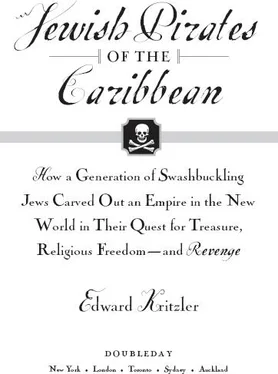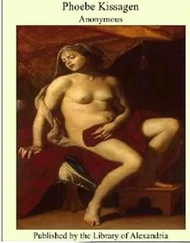Edward Kritzler - Jewish Pirates of the Caribbean
Здесь есть возможность читать онлайн «Edward Kritzler - Jewish Pirates of the Caribbean» весь текст электронной книги совершенно бесплатно (целиком полную версию без сокращений). В некоторых случаях можно слушать аудио, скачать через торрент в формате fb2 и присутствует краткое содержание. Год выпуска: 2008, ISBN: 2008, Издательство: Knopf Doubleday Publishing Group, Жанр: Старинная литература, на английском языке. Описание произведения, (предисловие) а так же отзывы посетителей доступны на портале библиотеки ЛибКат.
- Название:Jewish Pirates of the Caribbean
- Автор:
- Издательство:Knopf Doubleday Publishing Group
- Жанр:
- Год:2008
- ISBN:9780385528368
- Рейтинг книги:3 / 5. Голосов: 1
-
Избранное:Добавить в избранное
- Отзывы:
-
Ваша оценка:
- 60
- 1
- 2
- 3
- 4
- 5
Jewish Pirates of the Caribbean: краткое содержание, описание и аннотация
Предлагаем к чтению аннотацию, описание, краткое содержание или предисловие (зависит от того, что написал сам автор книги «Jewish Pirates of the Caribbean»). Если вы не нашли необходимую информацию о книге — напишите в комментариях, мы постараемся отыскать её.
Jewish Pirates of the Caribbean — читать онлайн бесплатно полную книгу (весь текст) целиком
Ниже представлен текст книги, разбитый по страницам. Система сохранения места последней прочитанной страницы, позволяет с удобством читать онлайн бесплатно книгу «Jewish Pirates of the Caribbean», без необходимости каждый раз заново искать на чём Вы остановились. Поставьте закладку, и сможете в любой момент перейти на страницу, на которой закончили чтение.
Интервал:
Закладка:
23. Primary sources for this chapter are quoted from the works of Arnold Wiznitzer and Rabbi Herbert Bloom.
24. Anita Libman Lebeson, Pilgrim People (New York: Harper and Brothers, 1950), 43; Wiznitzer, The Records of the Earliest Jewish Community in the New World, 55. The street led to the Jewish Square; there was also a Playa de Judios (Jewish Beach).
25. Lebeson, Pilgrim People, 43.
26. Wiznitzer, Jews in Colonial Brazil, 83.
27. Ibid., 111.
28. Jacob Rader Marcus, Early American Jewry, vol. 1 (Philadelphia: KTAV, 1975).
29. From the top, the figures in this paragraph are quoted from Herbert I. Bloom, “A Study of Brazilian Jewish History 1623–1654, Based Chiefly upon the Findings of the Late Samuel Oppenheim,” Publications of the American Jewish Historical Society 33 (1934), 86; Wiznitzer, Jews in Colonial Brazil, 35; ibid., 69–70; Bloom, “A Study,” 100.
30. Bloom, The Economic Activities of the Jews, 133.
31. Ibid., 133.
32. Wiznitzer, Jews in Colonial Brazil, 84.
33. Ibid., 72: From 1636 to 1645 the Company brought 23,163 slaves to Brazil, which they sold for 6,714,423 florins. After 1645, owing to the civil war the Company carried the slaves to Curaçao. The 26,000 figure is the estimate of Faber, Jews, Slaves and the Slave Trade, 21.
34. Faber’s Jews, Slaves and the Slave Trade uses primary source material, and focuses on the British slave trade in the seventeenth and eighteenth centuries, which demonstrates “the minimal nature of Jews’ involvement in the subjugation of Africans in the Americas.”
35. Wiznitzer, The Records of the Earliest Jewish Community, 22; In 1643, Moses apparently changed professions. He is listed as a tax collector, indicating he had retired from the sea, but not necessarily from his plundering ways.
36. Ibid.; pages 1–107 reprint (with index) “The Minute Book of Congregations Zur Israel of Recife and Magen Abraham of Mauricia, Brazil.” Invaluable work on these communities and their symbiotic relationship was done by Samuel Oppenheim, Herbert Bloom, and Arnold Wiznitzer. Much primary material is available, including the minute book of Zur Israel for the years 1648–53.
37. Bloom, “A Study,” 91.
38. Wiznitzer, Jews in Colonial Brazil, 74–75.
39. Adler, “A Contemporary Memorial,” 45; Yosef Kaplan, “The Portuguese Jews in Amsterdam: From Forced Conversion to Return to Judaism,” Studia Rosenthal 15 (1981), 41–42. Quote from trial record: “Esteban de Ares de Fonseca was living in Spain in Pamplona when he met a cousin from Bordeaux…where covert Jews ‘persuaded him to abandon the faith of the Lord Jesus of Nazareth and to adopt the Mosaic religion which is the true one and in which he will be saved.’…He arrived in Amsterdam in 1625 and was greeted by relatives who received him with ‘great joy and told him that these were the wonders of God who brings those who live in the blindness of Christianity to Judaism.’ They immediately began to take care of him in order to turn him into a Jew because (they said) he was the child of a mother of Jewish origin. When he saw this, he did not want to be circumcised or become a Jew and they placed him in the company of a rabbi to persuade him to observe (this religion) and after he spent six months with him and could not persuade him, they excommunicated him so that no Jew would come in contact with him or speak with him. After 15 or 16 days in that position in which nobody spoke to him or helped him, he went (to them) and they agreed to circumcise him. After circumcising him they named him David.” Kaplan writes: “It is doubtful we can rely on this as he sought to clear himself and present his conversion in Amsterdam as an act that was forced upon him against his will.”
40. Richard Dunn, Sugar and Slaves (Chapel Hill: University of North Carolina Press, 1972), 61; Wiznitzer, Jews in Colonial Brazil, 88; Bloom, “A Study,” 90.
41. Contraband trade via Amsterdam was so popular that in 1662 Spanish trading galleons, despite a two-year absence from the New World, went home with their holds half full.
42. Dutch territory in northeast Brazil included the provinces of Pernambuco, Itamaraca, Paraíba, and Rio Grande do Norte.
43. Wiznitzer, Jews in Colonial Brazil, 88–89 (transcript of letter in Wiznitzer’s appendix).
44. Bloom, The Economic Activities of the Jews, 138, 138n.
45. Wiznitzer, Jews in Colonial Brazil, 93.
46. Ibid., 116–17.
47. Ibid., 95–96.
48. Bloom, “A Study,” 94.
49. Wiznitzer, Jews in Colonial Brazil, 98.
50. I. S. Emmanuel, “New Light on Early American Jewry,” American Jewish Archives 8 (1955), 11.
51. Ibid., 9–13: Abraham da Costa was the head of the Parnassim who signed the petition that resulted in the Patenta Onrossa. He was the younger brother of Uriel, who had killed himself after renouncing his heretic beliefs, and elder brother to Joseph, who would later refer to the Patenta Onrossa in the struggle to achieve civil rights in New Amsterdam.
52. Ibid., 43–44.
53. Arnold Wiznitzer, “Jewish Soldiers in Dutch Brazil (1630–1654),” Publications of the American Jewish Historical Society 46 (September 1956), 46.
54. Ibid., 48.
55. Bloom, “A Study,” 126.
56. Ibid.
57. Ibid., 137.
58. Ibid., 130–31.
59. Wiznitzer, Jews in Colonial Brazil, 108–9, 210: text of King John’s reply.
60. Roth, A History of the Marranos, 306: Portugal’s reconquest of Brazil was due in large part to him. Da Silva “provided ships, supplies, and munitions to the army.” After he was accused of judaizing, his trial dragged on for five years. Da Silva was finally freed after he appeared as a pentitent, and in 1662, the king sent him to England with Catherine of Braganza to administer her dowry. Though he remained in London, he never joined the now legal Jewish community.
61. Bloom, “A Study…” 136–37.
62. Simon Wolf, The American Jew as Patriot, Soldier and Citizen (Boston: Gregg Press, 1972), 449.
63. Wiznitzer, The Records of the Earliest Jewish Community, 55n44.
64. Liebman, “The Great Conspiracy in Peru,” 176–90; Liebman, The Jews in New Spain, 225–35.
65. They could settle in the six small Dutch islands of Aruba, Bonaire, Curaçao, Saba, St. Eustacius, and St. Martin, and although France and England were still off-limits, they were welcome in the French Caribbean islands Guadaloupe and Martinque, and the English colonies Barbados and Nevis.
Chapter Seven: Exodus to Heretic Island
1. Arnold Wiznitzer, “The Exodus from Brazil and Arrival in New Amsterdam of the Jewish Pilgrim Fathers in 1654,” Publications of the American Jewish Historical Society 44 (Philadelphia, September 1954), 80–97.
2. Captain Thomas Southey, Chronological History of the West Indies (London: Frank Cass & Co., 1968; reprint of 1827 edition): In 1568, the Crown accused the current heir, Don Luis Colón, of “blocking an investigation into charges the Admiral had used his private jurisdiction on Jamaica to cover illegal trade.” The charge was he imported more goods than the island needed for the sole purpose of exporting them to other colonies. This was in violation of the mercantile system that mandated first profits to the homeland, i.e., all goods had to come and go via Seville. Richard Bloome, A Description of the Island of Jamaica with the other Isles and Territories in America in which English are Related (London, 1672), 44: When the English conquered Jamaica, “the number of inhabitants did not exceed 3,000 of which half were slaves. And the reason why it was so thinly peopled was…chiefly because this isle was held in proprietorship by the heirs of Columbus who received the revenues and placed governors as absolute Lord of it. And at first it was planted by a kind of Portugals, the society of whom the Spaniard abhors.”
Читать дальшеИнтервал:
Закладка:
Похожие книги на «Jewish Pirates of the Caribbean»
Представляем Вашему вниманию похожие книги на «Jewish Pirates of the Caribbean» списком для выбора. Мы отобрали схожую по названию и смыслу литературу в надежде предоставить читателям больше вариантов отыскать новые, интересные, ещё непрочитанные произведения.
Обсуждение, отзывы о книге «Jewish Pirates of the Caribbean» и просто собственные мнения читателей. Оставьте ваши комментарии, напишите, что Вы думаете о произведении, его смысле или главных героях. Укажите что конкретно понравилось, а что нет, и почему Вы так считаете.












